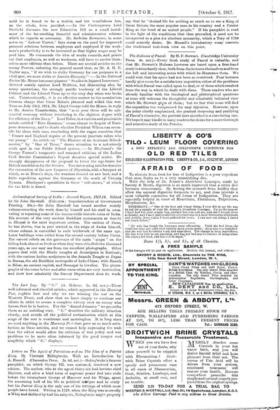until he is found to be a traitor, and her
trustfulness has, on the whole, been justified.—In the Contemporary Lord Sheffield discusses the now Education Bill as a small instal- ment of the far-reaching financial and administrative reforms which he regards as necessary. Mr. Seebolin Rowntree, in some notes on "Labour Unrest," lays stress on the need for improved personal relations between employers and employed if the work- man's productivity is to be increased so that higher wages may be paid him. He commends the idea of works councils, and points out that employers, as well as workmen, will have to render them- selves more efficient than before. There are several articles on the enemy Powers, enforcing the general moral that, as Mr. A. H. E. Taylor says, "if we wish to strike Germany for our purposes in a vital spot, we must strike at Austria-Hungary."—In the National Review Mr. Masse has some piquant" Studies in Injured Innocence," directed mainly against Lord Haldane, but illustrating also, by many quotations, the strongly pacific tendency of the Liberal Cabinet and the Liberal Press up to the very day when war broke out. Unintentionally, it is an effective answer to the mendacious German charge that Great Britain planned and willed this war. Thus on July 23rd, 1914, Mr. Lloyd George told the House, in reply to Mr. Austen Chamberlain, that "nest year there will be sub- stantial economy without interfering in the slightest degree with Gm efficiency of the Navy." Lord Esher, in a curious and pessimistic article entitled " Ecee Homines," seems almost to despair of Euro- pean democracy, and to doubt whether President Wilson can recon- cile his ideas with ours, concluding with the vague assertion that "France and England require at the present juncture rulers who are young." An article on "The Finance of an Assistant School- master," by "One of Therm" draws attention to a notoriously weak spot in our Public School system.—In Black-wood's Sir George Forrest's temperate and reasoned criticism of the Indian Civil Service Commission's Report deserves special notice. He strongly disapproves of the proposal to lower the age-limits for British candidates for the Service. Two interesting articles describe the coronation of the new Empress of Abyssinia. with a banquet at which, as in Bruce's days, the warriors feasted on raw beef, and a little expedition against the Germans at the south of Victoria Nyanza. Blacknood's specializes in these "side-shows," of which far too little is heard.




























 Previous page
Previous page